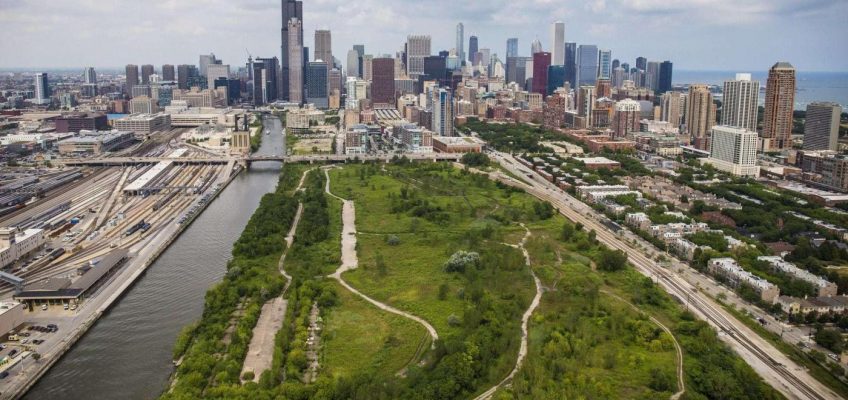Will the South Siders be playing baseball in the South Loop?
If the Chicago White Sox and developer Related Midwest built a baseball-only stadium at Roosevelt Road and Clark Street — an area known as “the 78″ — it could improve the experience for fans while boosting development in the area.
“The ballpark is right now not really in a neighborhood, it’s in the middle of nowhere, and a not very attractive nowhere,” said Allen Sanders, a senior lecturer at the University of Chicago who studies the economics of sports. “And getting to the ballpark, there is nothing wonderful about that experience.”
“Serious” negotiations have taken place between the Chicago White Sox and developer Related Midwest about the project, the Chicago Sun Times reported.
Related Midwest owns the site but declined to comment through Tricia Van Horn, vice president of marketing and communications. The Illinois Sports Facilities Authority — which owns Guaranteed Rate Field — has not been involved in the talks, the organization’s CEO, Frank Bilecki, told the Tribune.
“I’m not part of the discussion, at least as of yet,” Bilecki said. “I truly know nothing. I’m a landlord and they’re a tenant, and they’re looking at options as tenants do everywhere.”
The Sox and Mayor Brandon Johnson released a joint statement Thursday that did not address the possibility of a new stadium being built on the 78 site.
“Mayor Brandon Johnson and Chicago White Sox Chairman Jerry Reinsdorf met to discuss the historic partnership between the team and Chicago and the team’s ideas for remaining competitive in Chicago in perpetuity,” the statement reads. “The partnership between the City and the team goes back more than a century and the Johnson administration is committed to continuing this dialogue moving forward.”
Sanders, a White Sox fan who often attends games, and who is also a longtime critic of using public funds to finance new stadiums, said a new ballpark may not do much to boost attendance.
“The bigger problem might be it’s a really bad baseball team, coupled with the fact that senior ownership hasn’t exactly endeared itself to the public,” he said.
The question about how any new ballpark would be funded is significant. Guaranteed Rate Field — where the Sox lease runs through 2029 — was paid for using money raised through an increase in Chicago hotel room taxes in a last-minute deal in Springfield in 1988. The city and state also each kick in $5 million per year.
The ISFA still owes about $50 million toward the construction of the stadium, which opened near 35th Street and Shields Avenue in 1991.
Gov. J.B. Pritzker has indicated he’s generally not supportive of state money going toward private, professional sports teams. He expressed this sentiment in the last year over rumblings about whether the Sox would move and in the Chicago Bears’ quest to find a new stadium in the city or suburbs.
As for the reports of the latest talks involving a possible new stadium for the Sox, Pritzker suggested he’d be open to listening to any proposals.
“Nobody’s made an ask yet, so having said that, I think you know my views about privately owned teams and whether the public should be paying for private facilities that will be used by private businesses,” the governor said during an unrelated event at an elementary school outside of Springfield. “Having said that, I mean, there are things that government does to support business all across the state, investing in infrastructure, making sure that we’re supporting the success of business in Illinois.
“So, as with all of the other (things), whether it’s sports teams or other private businesses, we’ll be looking at whatever they may be suggesting for asking.”
Where the Sox will be playing in the future has been a topic of conversation for several months.
In August, Crain’s Chicago Business reported the team was considering a move when its lease at Guaranteed Rate Field expires.
At that time, the Sox said in a statement: “We have not had any conversations about our lease situation, but with six years remaining, it is naturally nearing a time where discussions should begin to take place. The conversations would be with the city, ISFA and the state and most likely would be about vision, opportunities and the future.”
The Sox confirmed a meeting between Reinsdorf and Nashville Mayor Freddie O’Connell took place during the MLB winter meetings in December. But they did not disclose the topics discussed.
Nashville has long been mentioned in speculation as a city to consider if MLB decides to expand.
A Sox move could add a wrinkle to the Bears’ efforts to build a new enclosed stadium. The Bears spent $197 million to buy the former Arlington Park racetrack almost a year ago but have made little progress since then to get tax subsidies or resolve a dispute over property taxes with local school districts.
The Bears have also had discussions with Johnson about staying in the city and with officials about potential sites in Naperville, Waukegan and elsewhere.
Arlington Heights Mayor Tom Hayes said he couldn’t speculate about how the Sox talks might affect the Bears’ options, saying he was still trying to arrange face-to-face meetings between the team and the schools.
“I don’t anticipate that this would negatively impact the momentum we’ve been trying to gain,” he said. “We’re very hopeful things are moving in the right direction, and we’re continuing to work on it.”
A Sox relocation to the 78 might be modeled on the Atlanta Braves’ Truist Park, which opened in 2017 as an anchor to The Battery, a surrounding area of restaurants, housing and entertainment.
Such a mixed-use development is what the Bears have proposed for Arlington Heights. But at 62 acres, the Chicago site is much smaller than the 326 acres at the former Arlington horse track.
The Tribune’s Jeremy Gorner reported from Rochester, Ill.
()


Leave a Reply